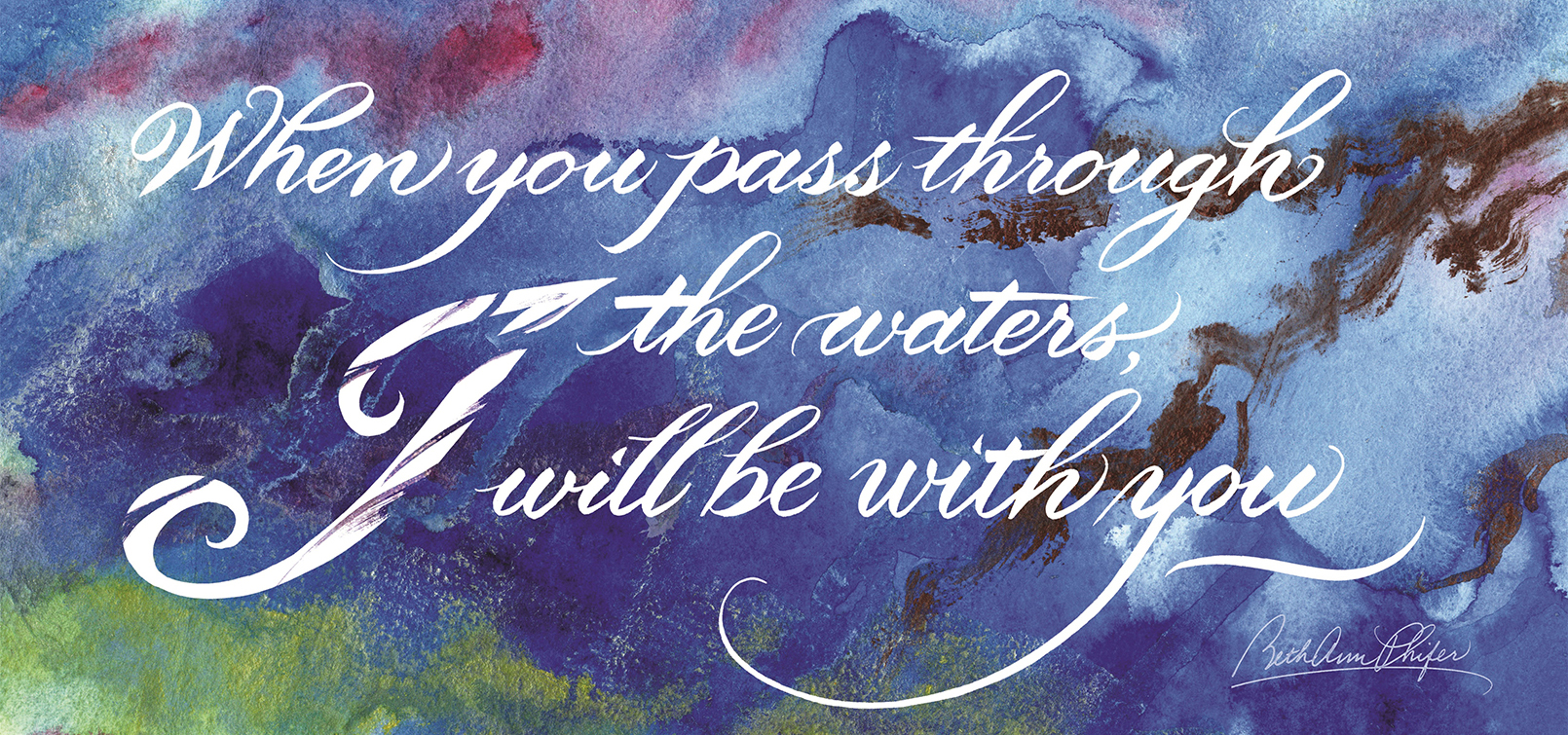 January 9, 2022: May God’s words be spoken, may God’s words be heard. Amen.
January 9, 2022: May God’s words be spoken, may God’s words be heard. Amen.
Happy New Year one and all!
It is good to be back, though I do love the twelve days of Christmas. I think it is kind of sad that right after the Magi make their long journey to the Christ child, everyone is too ready to pack away the decorations, including the creche. But maybe, just maybe, we need to re-think that a bit. Maybe it wouldn’t hurt to leave our nativity displays out all year – perhaps then we would be reminded of something we are hearing in today’s scriptures – something that is fundamental to our faith – something that is a part of who we are as those baptized into Christ, whose birth we just proclaimed.
So, let’s take a look at the scriptures today…
First, I want to just bring forward three verses in the passage from Isaiah. God says: “Do not fear, for I have redeemed you; I have called you by name, you are mine. When you pass through the waters, I will be with you;… Because you are precious in my sight, and honored, and I love you…”
You know, that is the only place in all of our sacred canon of scripture where we are told that God said “I love you.” God demonstrates this love again and again, but only here, in this passage from Isaiah, do we hear God say it. What a wonderous thing to hear! Sometimes we need to hear the words, right?
Now, hold on to that for a moment, and let’s move to Luke & The Acts of the Apostles because there is a whole lot of passing through the waters going on there too. In the gospel, Jesus is being baptized (along with a bunch of others), and in the book of Acts, Samaritans are being baptized. And it is this pairing that will help us to really understand just how much God does indeed love us, and what that means for each of us baptized into Christ.
In this version of the baptism of Jesus, the first thing to ask is…who exactly is baptizing Jesus? Now I always tell you to be mindful when the lectionary leaves out verses, and today, we read Luke 3:15-17 and 21-22. But you know what happened in verses 18, 19, and 20 – the verses just before Jesus got baptized? John got arrested by Herod. Not the Herod we just heard about in the birth narrative – that would be Herod Numero Uno (or Herod The Great) – his Dad. This is Herod Antipas, who is sort of a chop off the old block. Sadly, John would know that to be true, because he is eventually beheaded by said Herod.
Sooooo, who baptized Jesus?
Well, it was John, and our clue is that bit about “when all the people were baptized, and Jesus also had been baptized…” The author backtracked in the story like a flashback scene in a novel, and seems to want to emphasize something about John, something that is important – that his preaching of repentance – of returning into relationship with the God who loves us – really annoyed folks who had power. Preaching the gospel can do that sometimes…actually, a lot of the time.
That mystery over, let’s get back to Jesus being baptized. As he rises from the water, the Holy Spirit descends upon him and he hears “You are my Son, the Beloved, with you I am well pleased.” And here’s the most important thing to know about this…what happened to Jesus happens to all who are baptized into him.
Baptism is one of the two Great Sacraments of the church (the other being the Holy Eucharist – and no, despite what some might think, Coffee Hour is not the Third Great Sacrament). Now, a sacrament is an outward and visible sign of an inward and spiritual grace. In Baptism, the outward sign is water– the inward is, according to the catechism you can find right there in those Books of Common Prayer in the pews, “union with Christ in his death and resurrection, birth into God’s family the Church, forgiveness of sins, and new life in the Holy Spirit.”
Today, little Duke Telemaque will be baptized. And like Jesus so long ago, like all who are baptized into him, the Spirit will descend upon him, Christ will claim him, and he will enter into the household of God. The Holy Spirit descends upon each of us baptized, just as it did Jesus – just as it does for everyone.
Yet what about that baptism of the Samaritans we just heard – the Spirit didn’t descend on them as they rose out of the water, right? To understand that, we need to be reminded that the people of Samaria, and the Jewish people – and all the apostles, as well as Jesus, were Jewish – were like cousins caught in a long-standing bitter feud. Yet in the Gospel of Luke, we get the story of the “Good Samaritan,” and in this gospel’s sequel, we hear about this baptism. If you know something about both those books, then you might come to know why the Samaritans are brought forward in this way in his writings. First, both books were written by the same author – essentially a two-part story. And what we know about this author is that he was writing for a Gentile audience – people outside the circle of Jesus’ earliest Jewish followers.
So, the Samaritans were baptized into Christ, but in the story, the Spirit did not descend upon them until the apostles in Jerusalem heard about it and sent Peter and John to them. Now, we might think that it means that those apostles controlled this act of the Spirit, but no human controls God. In fact, later in this book of Acts, the Spirit arrives upon the Centurion Cornelius and all the others before any apostle baptizes them! So, the Holy Spirit will do whatever the Holy Spirit wants to do when She wants to do it.
Now, back to the passage we heard today – why the delay with the Samaritans? Knowing the way that Jews and Samaritans looked on one another, the delay was not about the Samaritans, but about the apostles. They needed to witness God’s work in these people so that they would truly know that salvation is for all of the people – all of God’s children.
And when we take that in, on the heels of the nativity story of shepherds on Christmas, after celebrating the arrival of the Magi to the Christ child, and now hearing these scriptures today – we finally have an epiphany of our own if we are paying attention, and it is this:
There are no outsiders in God’s kingdom. No one is excluded from the love God expressed in Isaiah.
Yet we act sometimes as though we can divide the world into insiders and outsiders (with ourselves, of course, always being on the inside of whatever boundary we artificially draw). Even today in our country, the beloved Feast of the Epiphany, a day in which we remember the outsiders who followed his star and presented Jesus with gifts that marked his identity as King, God, and Sacrifice – that day, at least for the foreseeable future, will coincide with remembering an act of domestic terrorism. January 6th is now a day when racism, misogyny, and all the hate that goes with it are brought to our hearts and minds because one year ago terrorists tried to destroy our democratic republic with violence and hate. What was worse about that day a year ago was that many were holding large crosses and signs proclaiming Jesus as Lord.
How corrupted must their faith in Jesus be that, on the day when the Magi are remembered, they carried crosses and other signs of our faith as they violently beat police and sought to harm members of Congress and the Vice-President? Had any of them truly understood the meaning of the Magi their faith remembers on this day, then they would know that all people are their sisters and brothers, and no person who claims to follow Jesus could ever act with such hate and violence against another child of God.
It just seems so unfathomable, yet as I watched the commemoration by Congress a few days ago, and listened to our Presiding Bishop offer prayers at the national vigil, it occurred to me that perhaps it is a good thing that the Feast of the Epiphany and that disgraceful act of violence and hate coincide – because it is a pairing of the vision of God, and of the reality of our sinful world. It is a reminder of what the incarnation and the Epiphany was all about, and what our baptism means.
For Jesus was born into such a world as we live in today, where the innocent are slaughtered by the powerful. He was baptized when rulers seized righteous men like John and killed them. He walked among those who hungered for food, who thirsted for justice, who were oppressed by those with might. He was executed for being a man of peace in a land of war, a person who healed in a place where pain is inflicted, for preaching love among those who hate.
So perhaps it is fitting that those two events – the Feast of the Epiphany and this act of violence and hate – are on the same day. And perhaps it would help to keep our nativity sets out all year too. Let it all be a reminder to us, the ones baptized into Christ – that we have much work to do to bring about the vision of God for all people. For like those apostles who needed to see the Holy Spirit descend upon the Samaritans, we too may need a reminder from time to time that our faith is not one of walls, but of bridges, not one of hate, but of love, not one of division, but of peace.
What a message for us all today!
Because if we have learned anything from this pandemic it is that we cannot live our lives on this earth as though what we do does not affect others. We are all sisters and brothers – all children of God – no matter what country we are from, what language we speak, what gender we claim, who we love, and yes – no matter who we vote for – every single one of us is loved by God. Now we know that COVID is infectious, but you know what else is? Love. Love is infectious! That is one thing we need to spread all over the world – Love – the knowledge of God’s all inclusive love for us. For while we know that hate too is infectious, we know through Christ that the power of love will always triumph over hate.
We who are baptized into Christ, are baptized into his life and death – and we are anointed by the Holy Spirit to be the transformative agents of God’s love, because we know through Jesus that light overcomes darkness, life is more powerful than death, and love always defeats hate.
So let us look throughout the year upon that nativity with the Holy Family surrounded by those outsiders – the shepherds and the Magi – that we may remember our baptism, and what this birth that we just celebrated means.
I want to share with you this poem by Howard Thurman, an African-American theologian, educator, and civil rights leader because he so beautifully captured what this moment in our lives as followers of Jesus is all about:
“When the song of the angels is stilled,
when the star in the sky is gone,
when the kings and princes are home,
when the shepherds are back with their flocks,
the work of Christmas begins:
to find the lost,
to heal the broken,
to feed the hungry,
to release the prisoner,
to rebuild the nations,
to bring peace among the people,
to make music in the heart.”
Folks, we can put away the decorations, and stop singing the carols (okay – I admit, I am still singing them), but the incarnation – that wonderous gift of God’s grace and love – is not a thing for a season. Our savior, born to us at Christmas, and manifested to us in Epiphany, is ready and willing to enter into our hearts, if only we will let him. And if we do – it will change us – it will change everything!
The work of Christmas is only just getting started, and it continues every hour of every day, year after year after year!
And when we grow tired, when we feel overwhelmed by the work we must do, or forget who we are and what we are called to do, look on that nativity scene and remember that precious gift of love and grace, holding these words of God close to your heart: “Do not fear, for I have redeemed you; I have called you byname, you are mine. When you pass through the waters, I will be with you;…Because you are precious in my sight, and honored, and I love you…”
Amen.
For the audio, click below, or subscribe to our iTunes Sermon Podcast by clicking here:
The Rev. Diana L. Wilcox
Christ Church in Bloomfield & Glen Ridge
January 9, 2022
The First Sunday After The Epiphany
1st Reading – Isaiah 43:1-7
Psalm 29
2nd Reading – Acts 8:14-17
Gospel – Luke 3:15-17, 21-22






